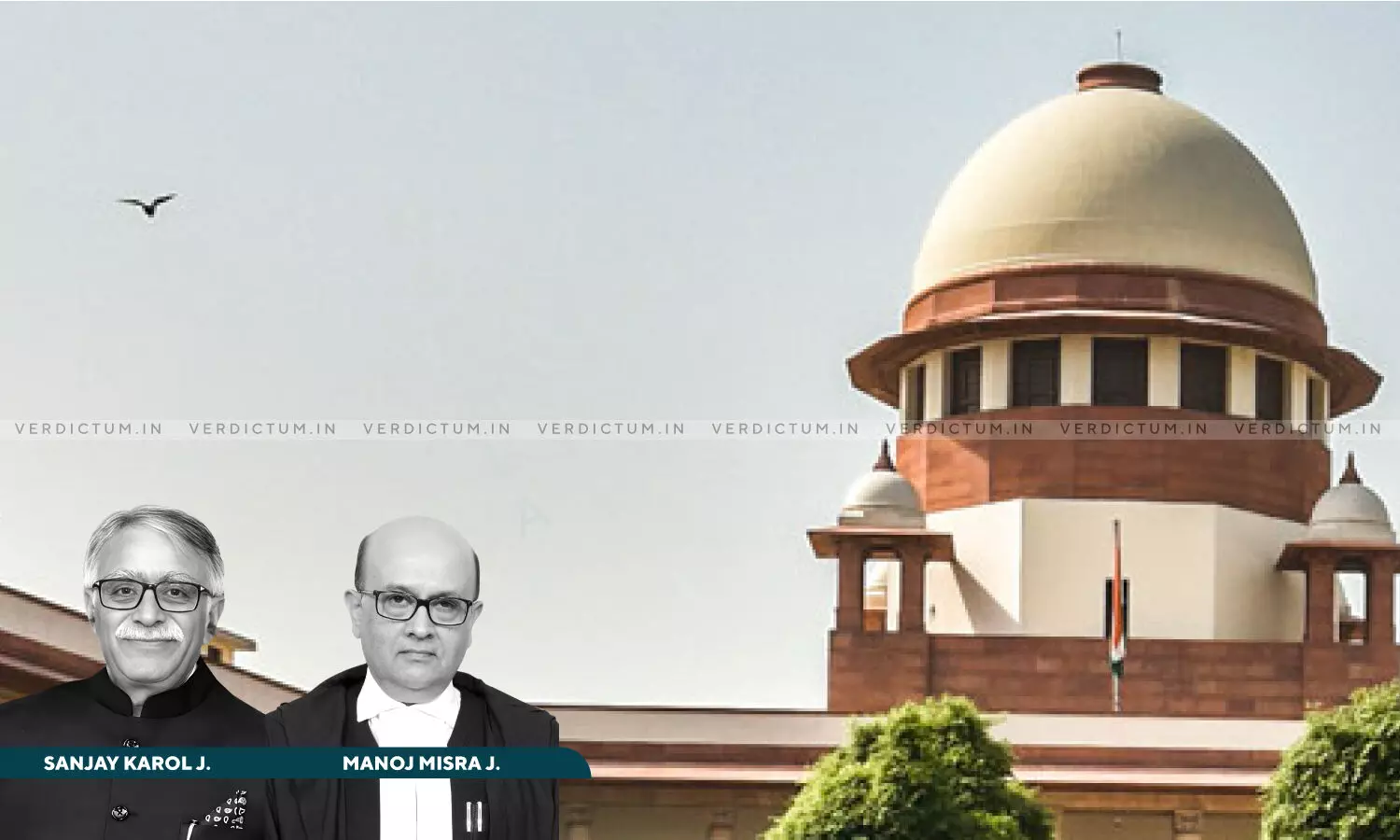
Contract For Sale Does Not Create Interest Or Charge Over Immovable Property Without Sale Deed: Supreme Court
 |
|The Supreme Court has reiterated that a contract for the sale of immovable property does not, by itself, create any interest or charge over the property unless a valid sale deed is executed.
The Court clarified that ownership rights are transferred only upon registration of the conveyance deed, and an unfulfilled agreement for sale does not terminate an existing landlord-tenant relationship.
The Bench of Justice Sanjay Karol and Justice Manoj Misra observed, "As per Section 54 of the Transfer of Property Act, 1882, a contract for the sale of immovable property is a contract that a sale of such property shall take place on terms settled between the parties. It does not, of itself, create any interest in or charge on such property. Thus, even if the suit for specific performance is decreed, without a specific decree for transfer of the possession of the suit property, the same can be enforced only when the court directs the judgment-debtor to convey the suit property to the decree holder. It is only after registration that the transfer of title would take place from one to the other."
The Court was hearing a Civil Appeal filed against a Punjab and Haryana High Court Order and Judgment, whereby it had allowed Civil Revision No. 7550 of 2012 filed by the respondent under Section 15(5) of the East Punjab Urban Rent Restriction Act, 1949, and set aside the eviction order passed by the Rent Controller, as affirmed by the Appellate Authority.
Background of the Case
The case originated when the Appellant, the owner of a disputed property, filed an eviction petition under Section 13 of the East Punjab Urban Rent Restriction Act, 1949. He claimed that the Respondent was inducted as a tenant in June 2007 at a monthly rent of Rs. 5,000. Subsequently, an agreement for sale was executed on October 3, 2007, with an extended deadline for execution of the sale deed set for November 30, 2007. However, the Respondent failed to comply, leading to a decree for specific performance, which lapsed due to non-payment of the balance consideration.
Alleging non-payment of rent since August 2007, the Appellant sought eviction and recovery of arrears. The Rent Controller ruled in favor of the appellant, establishing the landlord-tenant relationship and ordering eviction. This was affirmed by the Appellate Authority but was later overturned by the High Court, which held that no tenancy existed due to the sale agreement.
Court's Observations
The Court, while analyzing the High Court's decision, emphasized that:
1. Tenancy Can Exist Without a Written Agreement:The apex court held that the absence of a rent note does not negate a landlord-tenant relationship, which can be oral and supported by evidence.
2. Sale Agreement Does Not End Tenancy: A contract for sale does not create ownership rights unless a valid sale deed is executed. The respondent’s failure to fulfill the conditions of the decree meant that no title had passed.
3. Revisional Powers Limited: The High Court exceeded its jurisdiction by interfering with concurrent factual findings of the Rent Controller and the Appellate Authority, which had established tenancy based on evidence.
Citing Section 54 of the Transfer of Property Act, 1882, the Court reiterated that a mere agreement for sale does not transfer ownership or alter tenancy rights unless a proper conveyance is executed. Since the decree for specific performance remained unfulfilled, the landlord-tenant relationship remained intact.
Consequently, the Court set aside a Punjab and Haryana High Court ruling and restored the eviction order passed by the Rent Controller and affirmed by the Appellate Authority.
"In the instant case, admittedly, the decree for specific performance was a conditional decree and the decree holder (the respondent herein) had failed to fulfill the condition and, therefore, the decree could not fructify into a conveyance. In such circumstances, there was no transfer of property from the appellant to the respondent," the Bench noted.
The Court held that the landlord-tenant relationship continues unless a valid sale deed is executed, rejecting the respondent's claim that a specific performance decree had terminated the tenancy. "...there was no termination of landlord-tenant relationship between the parties by virtue of Section 111(d)3 of the Transfer of Property Act, 1882. In consequence, there was no good reason for the High Court to set aside concurrent findings of fact returned by the two courts below," it observed.
Accordingly, the Appeal was allowed and the High Court Judgment was set aside.
Cause Title: Som Nath v. Ravinder Kumar [Civil Appeal No. 4484 of 2025]
Appearance:-
Petitioner: Advocates N. P. S. Maan, Hitesh Kumar, Pranav Singh Gautam, R. C. Kaushik (AOR)
Respondent: Advocates Gagan Gandhi, Bhaskar Aditya (AOR)
Click here to read/download the Order